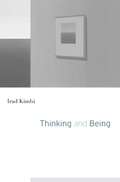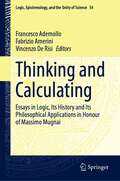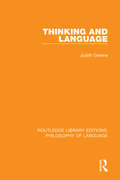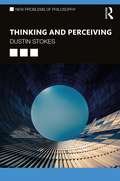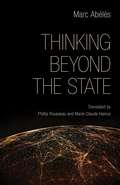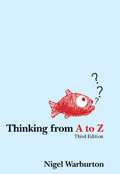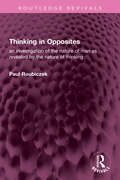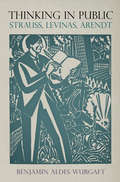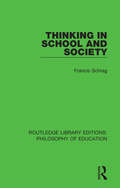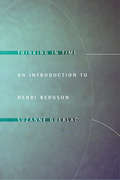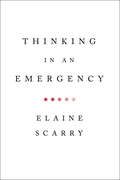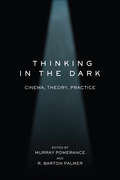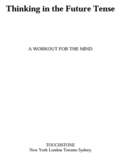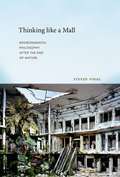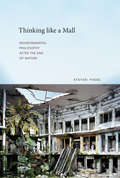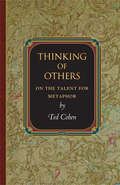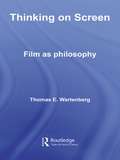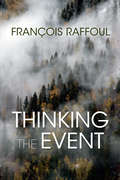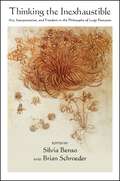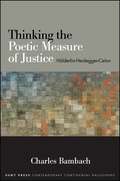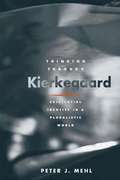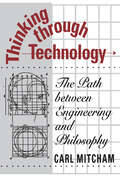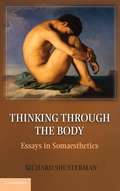- Table View
- List View
Thinking and Being
by Irad KimhiOpposing a long-standing orthodoxy of the Western philosophical tradition running from ancient Greek thought until the late nineteenth century, Frege argued that psychological laws of thought—those that explicate how we in fact think—must be distinguished from logical laws of thought—those that formulate and impose rational requirements on thinking. Logic does not describe how we actually think, but only how we should. Yet by thus sundering the logical from the psychological, Frege was unable to explain certain fundamental logical truths, most notably the psychological version of the law of non-contradiction—that one cannot think a thought and its negation simultaneously. Irad Kimhi’s Thinking and Being marks a radical break with Frege’s legacy in analytic philosophy, exposing the flaws of his approach and outlining a novel conception of judgment as a two-way capacity. In closing the gap that Frege opened, Kimhi shows that the two principles of non-contradiction—the ontological principle and the psychological principle—are in fact aspects of the very same capacity, differently manifested in thinking and being. As his argument progresses, Kimhi draws on the insights of historical figures such as Aristotle, Kant, and Wittgenstein to develop highly original accounts of topics that are of central importance to logic and philosophy more generally. Self-consciousness, language, and logic are revealed to be but different sides of the same reality. Ultimately, Kimhi’s work elucidates the essential sameness of thinking and being that has exercised Western philosophy since its inception.
Thinking and Calculating: Essays in Logic, Its History and Its Philosophical Applications in Honour of Massimo Mugnai (Logic, Epistemology, and the Unity of Science #54)
by Francesco Ademollo Fabrizio Amerini Vincenzo De RisiThis volume collects 22 essays on the history of logic written by outstanding specialists in the field. The book was originally prompted by the 2018-2019 celebrations in honor of Massimo Mugnai, a world-renowned historian of logic, whose contributions on Medieval and Modern logic, and to the understanding of the logical writings of Leibniz in particular, have shaped the field in the last four decades. Given the large number of recent contributions in the history of logic that have some connections or debts with Mugnai’s work, the editors have attempted to produce a volume showing the vastness of the development of logic throughout the centuries. We hope that such a volume may help both the specialist and the student to realize the complexity of the history of logic, the large array of problems that were touched by the discipline, and the manifold relations that logic entertained with other subjects in the course of the centuries. The contributions of the volume, in fact, span from Antiquity to the Modern Age, from semantics to linguistics and proof theory, from the discussion of technical problems to deep metaphysical questions, and in it the history of logic is kept in dialogue with the history of mathematics, economics, and the moral sciences at large.
Thinking and Language: Topics In Cognitive Psychology (New Essential Psychology Ser.)
by Judith GreeneOriginally published in 1875, this book discusses thinking and language and traces the development of different pscyological approaches, assessing their theoretical significance and the experimental evidence behind them. It ends by drawing together the various lines of argument to arrive at some general conclusions about language and thought, since it clearly emerges that the two are inextricably linked.
Thinking and Perceiving (New Problems of Philosophy)
by Dustin StokesHuman beings are in contact with the world through their minds. One can make sensory perceptual contact with the world: One sees the tree and hears its leaves flutter. And one makes cognitive contact with the world: One forms beliefs about the tree, memories of how it was in the past, and expectations of how it will be in the future. Can the first, perception, be influenced in important ways by the second, cognition? Do cognitive states such as memories, beliefs, and expectations affect what one perceives through the senses? And what is the importance of these possible relations to how we theorize and understand the human mind? Possible cognitive influence on perception (sometimes called "cognitive penetration of perception") has been long debated in philosophy of mind and cognitive science: Some argue that such influence occurs, while others argue that it does not or cannot. In this excellent introduction and overview of the problem, Dustin Stokes examines the following: The philosophical and scientific background to cognition and perception Contemporary ways of distinguishing cognition and perception Questions about the representational content of perception versus cognition Distinct theories of mental architecture: modularity versus malleability Consequences for epistemology, philosophy of science, and aesthetics Philosophical and scientific research on perceptual attention Perceptual skill, learning, and expertise Perceptual content, objectivity, and cultural bias. Additional features, such as chapter summaries, suggestions for further reading, and a glossary, make Thinking and Perceiving an ideal resource for students of philosophy of mind and psychology, cognitive psychology, and cognitive science.
Thinking beyond the State
by Marc AbélèsThe French scholar Marc Abélès is one of the leading political and philosophical anthropologists of our time. He is perhaps the leading anthropologist writing on the state and globalization. Thinking beyond the State, a distillation of his work to date, is a superb introduction to his contributions to both anthropology and political philosophy. Abélès observes that while interdependence and interconnection have become characteristic features of our globalized era, there is no indication that a concomitant evolution in thinking about political systems has occurred. The state remains the shield—for both the Right and the Left—against the turbulent effects of globalization. According to Abélès, we live in a geopolitical universe that, in many respects, reproduces alienating logics. His book, therefore, is a primer on how to see beyond the state. It is also a testament to anthropology’s centrality and importance in any analysis of the global human predicament. Thinking beyond the State will find wide application in anthropology, political science and philosophy courses dealing with the state and globalization.
Thinking from A to Z
by Nigel WarburtonWhat is ‘humpty-dumptying’? Do ‘arguments from analogy’ ever stand up? How do I know when someone is using ‘weasel words’? What’s the difference between a ‘red herring’ and a ‘straw man’? This superb book, now in its third edition, will help anyone who wants to argue well and think critically. Using witty and topical examples, this fully-updated edition includes many new entries and updates the whole text. New entries include: Principle of Charity Lawyer’s Answer Least Worst Option Poisoning the Well Sentimentality Sunk Cost Fallacy Weasel Words ‘You would say that wouldn’t you’. Thinking from A to Z may not help you win every argument, but it will definitely give you the power to tell a good one from a bad one.
Thinking from Things: Essays in the Philosophy of Archaeology
by Alison WylieAlison Wylie explores how archaeologists know what they know. Examining the history and methodology of Anglo-American archaeology, Wylie puts the tumultuous debates of the last thirty years in historical and philosophical perspective.
Thinking in Opposites: an investigation of the nature of man as revealed by the nature of thinking (Routledge Revivals)
by Paul RoubiczekFirst published in 1952, Thinking in Opposites insists on the need for a carefully thought-out, rather than a merely authoritarian, basis for faith; but also insists that an indispensable preliminary is to know the laws which govern and limit the scope of human thinking in relation to three areas: the external world as it is; the internal world of feeling; and the interrelation of each of these with the other. This book is not a technical work in philosophy and the theory of knowledge; but it deals with problems in those fields which have usually been handled only in technical language. Therefore, this is a book both for the expert and for the intelligent and thoughtful layman: for the man who has a sense of responsibility for what he believes, and who is able to justify his faith amid the chaos of our times.
Thinking in Public
by Benjamin Aldes WurgaftLong before we began to speak of "public intellectuals," the ideas of "the public" and "the intellectual" raised consternation among many European philosophers and political theorists. Thinking in Public examines the ambivalence these linked ideas provoked in the generation of European Jewish thinkers born around 1900. By comparing the lives and works of Hannah Arendt, Emmanuel Levinas, and Leo Strauss, who grew up in the wake of the Dreyfus Affair and studied with the philosopher--and sometime National Socialist--Martin Heidegger, Benjamin Aldes Wurgaft offers a strikingly new perspective on the relationship between philosophers and politics.Rather than celebrate or condemn the figure of the intellectual, Wurgaft argues that the stories we tell about intellectuals and their publics are useful barometers of our political hopes and fears. What ideas about philosophy itself, and about the public's capacity for reasoned discussion, are contained in these stories? And what work do we think philosophers and other thinkers can and should accomplish in the world beyond the classroom? The differences between Arendt, Levinas, and Strauss were great, but Wurgaft shows that all three came to believe that the question of the social role of the philosopher was the question of their century. The figure of the intellectual was not an ideal to be emulated but rather a provocation inviting these three thinkers to ask whether truth and politics could ever be harmonized, whether philosophy was a fundamentally worldly or unworldly practice.
Thinking in School and Society (Routledge Library Editions: Philosophy of Education #16)
by Francis SchragIn this book, first published in 1988, the author integrates relevant ideas from philosophy, psychology, sociology, economics and political science to provide a comprehensive analysis of the problem of education for thinking. Professor Schrag takes account of the classroom as well as the larger society, and includes practical recommendations for creating new settings designed to enhance students’ thoughtfulness.
Thinking in Time: An Introduction to Henri Bergson
by Suzanne Guerlac"In recent years, we have grown accustomed to philosophical language that is intensely self-conscious and rhetorically thick, often tragic in tone. It is enlivening to read Bergson, who exerts so little rhetorical pressure while exacting such a substantial effort of thought.... Bergson's texts teach the reader to let go of entrenched intellectual habits and to begin to think differently—to think in time.... Too much and too little have been said about Bergson. Too much, because of the various appropriations of his thought. Too little, because the work itself has not been carefully studied in recent decades."—from Thinking in TimeHenri Bergson (1859–1941), whose philosophical works emphasized motion, time, and change, won the Nobel Prize for Literature in 1927. His work remains influential, particularly in the realms of philosophy, cultural studies, and new media studies. In Thinking in Time, Suzanne Guerlac provides readers with the conceptual and contextual tools necessary for informed appreciation of Bergson's work. Guerlac's straightforward philosophical expositions of two Bergson texts, Time and Free Will (1888) and Matter and Memory (1896), focus on the notions of duration and memory—concepts that are central to the philosopher's work. Thinking in Time makes plain that it is well worth learning how to read Bergson effectively: his era and our own share important concerns. Bergson's insistence on the opposition between the automatic and the voluntary and his engagement with the notions of "the living," affect, and embodiment are especially germane to discussions of electronic culture.
Thinking in an Emergency (Norton Global Ethics Series)
by Elaine ScarryAward-winning critic Elaine Scarry provides a vital new assessment of leadership during crisis that ensures the protection of democratic values. In Thinking in an Emergency, Elaine Scarry lays bare the realities of "emergency" politics and emphasizes what she sees as the ultimate ethical concern: "equality of survival." She reveals how regular citizens can reclaim the power to protect one another and our democratic principles. Government leaders sometimes argue that the need for swift national action means there is no time for the population to think, deliberate, or debate. But Scarry shows that clear thinking and rapid action are not in opposition. Examining regions as diverse as Japan, Switzerland, Ethiopia, and Canada, Scarry identifies forms of emergency assistance that represent "thinking" at its most rigorous and remarkable. She draws on the work of philosophers, scientists, and artists to remind us of our ability to assist one another, whether we are called upon to perform acts of rescue as individuals, as members of a neighborhood, or as citizens of a country.
Thinking in the Dark: Cinema, Theory, Practice
by Murray Pomerance Johannes Von Moltke Daniel Morgan R. Barton Palmer Dudley Andrew Tom Conley Sarah Keller Colin Williamson Steven Rybin Steven Woodward Jeremy Blatter Professor William Rothman Tom Gunning Gilberto Perez Professor Kristen Hatch Dominic Lennard Alex Clayton Nathan Holmes Will Scheibel Jonah Corne Professor William Brown Professor Matthew SolomonToday's film scholars draw from a dizzying range of theoretical perspectives--they're just as likely to cite philosopher Gilles Deleuze as they are to quote classic film theorist André Bazin. To students first encountering them, these theoretical lenses for viewing film can seem exhilarating, but also overwhelming. Thinking in the Dark introduces readers to twenty-one key theorists whose work has made a great impact on film scholarship today, including Rudolf Arnheim, Sergei Eisenstein, Michel Foucault, Siegfried Kracauer, and Judith Butler. Rather than just discussing each theorist's ideas in the abstract, the book shows how those concepts might be applied when interpreting specific films by including an analysis of both a classic film and a contemporary one. It thus demonstrates how theory can help us better appreciate films from all eras and genres: from Hugo to Vertigo, from City Lights to Sunset Blvd., and from Young Mr. Lincoln to A.I. and Wall-E. The volume's contributors are all experts on their chosen theorist's work and, furthermore, are skilled at explaining that thinker's key ideas and terms to readers who are not yet familiar with them. Thinking in the Dark is not only a valuable resource for teachers and students of film, it's also a fun read, one that teaches us all how to view familiar films through new eyes. Theorists examined in this volume are: Rudolf Arnheim, Béla Balázs, Roland Barthes, André Bazin, Walter Benjamin, Judith Butler, Stanley Cavell, Michel Chion, Gilles Deleuze, Jean Douchet, Sergei Eisenstein, Jean Epstein, Michel Foucault, Siegfried Kracauer, Jacques Lacan, Vachel Lindsay, Christian Metz, Hugo Münsterberg, V. F. Perkins, Jacques Rancière, and Jean Rouch.
Thinking in the Future Tense
by Jennifer JamesExplains the changes that are taking place in the business world and offers advice on obtaining the skills not only to survive, but to prosper. These include: perspective - the ability to identify the important changes; energy - doing more with less; and
Thinking like a Mall
by Steven VogelEnvironmentalism, in theory and practice, is concerned with protecting nature. But if we have now reached "the end of nature," as Bill McKibben and other environmental thinkers have declared, what is there left to protect? In Thinking like a Mall, Steven Vogel argues that environmental thinking would be better off if it dropped the concept of "nature" altogether and spoke instead of the "environment" -- that is, the world that actually surrounds us, which is always a built world, the only one that we inhabit. We need to think not so much like a mountain (as Aldo Leopold urged) as like a mall. Shopping malls, too, are part of the environment and deserve as much serious consideration from environmental thinkers as do mountains. Vogel argues provocatively that environmental philosophy, in its ethics, should no longer draw a distinction between the natural and the artificial and, in its politics, should abandon the idea that something beyond human practices (such as "nature") can serve as a standard determining what those practices ought to be. The appeal to nature distinct from the built environment, he contends, may be not merely unhelpful to environmental thinking but in itself harmful to that thinking. The question for environmental philosophy is not "how can we save nature?" but rather "what environment should we inhabit, and what practices should we engage in to help build it?"
Thinking like a Mall: Environmental Philosophy after the End of Nature (The\mit Press Ser.)
by Steven VogelA provocative argument that environmental thinking would be better off if it dropped the concept of “nature” altogether and spoke instead of the built environment.Environmentalism, in theory and practice, is concerned with protecting nature. But if we have now reached “the end of nature,” as Bill McKibben and other environmental thinkers have declared, what is there left to protect? In Thinking like a Mall, Steven Vogel argues that environmental thinking would be better off if it dropped the concept of “nature” altogether and spoke instead of the “environment”—that is, the world that actually surrounds us, which is always a built world, the only one that we inhabit. We need to think not so much like a mountain (as Aldo Leopold urged) as like a mall. Shopping malls, too, are part of the environment and deserve as much serious consideration from environmental thinkers as do mountains. Vogel argues provocatively that environmental philosophy, in its ethics, should no longer draw a distinction between the natural and the artificial and, in its politics, should abandon the idea that something beyond human practices (such as “nature”) can serve as a standard determining what those practices ought to be. The appeal to nature distinct from the built environment, he contends, may be not merely unhelpful to environmental thinking but in itself harmful to that thinking. The question for environmental philosophy is not “how can we save nature?” but rather “what environment should we inhabit, and what practices should we engage in to help build it?”
Thinking of Others: On the Talent for Metaphor (Princeton Monographs in Philosophy #37)
by Ted CohenIn Thinking of Others, Ted Cohen argues that the ability to imagine oneself as another person is an indispensable human capacity--as essential to moral awareness as it is to literary appreciation--and that this talent for identification is the same as the talent for metaphor. To be able to see oneself as someone else, whether the someone else is a real person or a fictional character, is to exercise the ability to deal with metaphor and other figurative language. The underlying faculty, Cohen argues, is the same--simply the ability to think of one thing as another when it plainly is not. In an engaging style, Cohen explores this idea by examining various occasions for identifying with others, including reading fiction, enjoying sports, making moral arguments, estimating one's future self, and imagining how one appears to others. Using many literary examples, Cohen argues that we can engage with fictional characters just as intensely as we do with real people, and he looks at some of the ways literature itself takes up the question of interpersonal identification and understanding. An original meditation on the necessity of imagination to moral and aesthetic life, Thinking of Others is an important contribution to philosophy and literary theory.
Thinking on Screen: Film as Philosophy
by Thomas E. WartenbergThinking on Screen: Film as Philosophy is an accessible and thought-provoking examination of the way films raise and explore complex philosophical ideas. Written in a clear and engaging style, Thomas Wartenberg examines films’ ability to discuss, and even criticize ideas that have intrigued and puzzled philosophers over the centuries such as the nature of personhood, the basis of morality, and epistemological skepticism. Beginning with a demonstration of how specific forms of philosophical discourse are presented cinematically, Wartenberg moves on to offer a systematic account of the ways in which specific films undertake the task of philosophy. Focusing on the films The Man Who Shot Liberty Valance, Modern Times, The Matrix, Eternal Sunshine of the Spotless Mind, The Third Man, The Flicker, and Empire, Wartenberg shows how these films express meaningful and pertinent philosophical ideas. This book is essential reading for students of philosophy with an interest in film, aesthetics, and film theory. It will also be of interest to film enthusiasts intrigued by the philosophical implications of film.
Thinking the Event (Studies in Continental Thought)
by François RaffoulThe author of The Origins of Responsibility presents &“a major contribution to philosophical scholarship on . . . the very idea of the event&” (Edward S. Casey, author of The World on Edge). In Thinking the Event, continental philosopher François Raffoul explores the question of what constitutes an event as an event: not what happens or why it happens, but what &“happening&” means. If it&’s true that nothing happens without a reason, as Leibniz famously posited, then does this principle of reason have a reason? Bringing together philosophical insights from Martin Heidegger, Jacques Derrida, Jean-Luc Nancy, and Jean-Luc Marion, Raffoul shows how the event, in its disruptive unpredictability, always exceeds causality, subjectivity, and reason. He then goes on to examine the inappropriability of this &“pure event&” and how this inappropriability may inform ethical and political considerations. In the wake of the exhaustion of traditional metaphysics, the notion of the event comes to the fore, with key implications for philosophy, ontology, ethics, and theories of selfhood. Raffoul&’s Thinking the Event is essential reading on this fascinating topic.
Thinking the Inexhaustible: Art, Interpretation, and Freedom in the Philosophy of Luigi Pareyson (SUNY series in Contemporary Italian Philosophy)
by Silvia Benso; Brian Schroeder; Dennis J. SchmidtWhat if the inexhaustible were the only mode of self-revelation of truth? The question of the inexhaustibility of truth, and its relation to being and interpretation, is the challenge posed by the philosophy of the prominent Italian thinker Luigi Pareyson (1918–1991). Art, the interpretation of truth, and the theory of being as the ontology of both inexhaustibility and freedom constitute the main themes of Pareyson's distinctive form of philosophical hermeneutics, which develops also on the basis of another fundamental concept, that of personhood understood in the radically existentialist sense of the human being. In Thinking the Inexhaustible, Silvia Benso and Brian Schroeder bring together essays devoted to Pareyson's hermeneutic philosophy by important international scholars, including well-known Italian thinkers Umberto Eco and Gianni Vattimo, who were both students of Pareyson. Pareyson's philosophy of inexhaustibility unfolds in conversation with major figures in Western intellectual history—from Croce to Valéry, Dostoevsky, and Berdyaev; from Kant to Fichte, Hegel, and German romanticism; and from Pascal to Schelling, Kierkegaard, Marcel, Jaspers, and Heidegger.
Thinking the Poetic Measure of Justice: Hölderlin-Heidegger-Celan (SUNY series in Contemporary Continental Philosophy)
by Charles BambachWhat is the measure of ethics? What is the measure of justice? And how do we come to measure the immeasurability of these questions? Thinking the Poetic Measure of Justice situates the problem of justice in the interdisciplinary space between philosophy and poetry in an effort to explore the sources of ethical life in a new way. Charles Bambach engages the works of two philosophical poets who stand as the bookends of modernity—Friedrich Hölderlin (1770–1843) and Paul Celan (1920–1970)—offering close textual readings of poems from each that define and express some of the crucial problems of German philosophical thought in the twentieth century: tensions between the native and the foreign, the proper and the strange, the self and the other. At the center of this philosophical conversation between Hölderlin and Celan, Bambach places the work of Martin Heidegger to rethink the question of justice in a nonlegal, nonmoral register by understanding it in terms of poetic measure. Focusing on Hölderlin's and Heidegger's readings of pre-Socratic philosophy and Greek tragedy, as well as on Celan's reading of Kabbalah, he frames the problem of poetic justice against the trauma of German destruction in the twentieth century.
Thinking through French Philosophy: The Being of the Question
by Leonard Lawlor"... no other book undertakes to relate all these French philosophers to each other the way that [Lawlor] does, brilliantly." --François RaffoulFor many, Jacques Derrida, Michel Foucault, and Gilles Deleuze represent one of the greatest movements in French philosophy. But these philosophers and their works did not materialize without a philosophical heritage. In Thinking through French Philosophy, Leonard Lawlor shows how the work of Maurice Merleau-Ponty formed an important current in sustaining the development of structuralism and post-structuralism. Seeking the "point of diffraction," or the specific ideas and concepts that link Derrida, Foucault, and Deleuze, Lawlor discovers differences and convergences in these thinkers who worked the same terrain. Major themes include metaphysics, archaeology, language and documentation, expression and interrogation, and the very experience of thinking. Lawlor's focus on the experience of the question brings out critical differences in immanence and transcendence. This illuminating and provocative book brings new vitality to debates on contemporary French philosophy.
Thinking through Kierkegaard: Existential Identity in a Pluralistic World
by Peter J. MehlThinking through Kierkegaard is a critical evaluation of Søren Kierkegaard's vision of the normatively human, of who we are and might aspire to become, and of what Mehl calls our existential identity. Through a pragmatist examination of three of Kierkegaard's key pseudonymous "voices" (Judge William, Climacus, and Anti-Climacus), Peter J. Mehl argues that Kierkegaard's path is not the only end of our search, but instead leads us to affirm a plurality of paths toward a fulfilling existential identity. Contrary to Kierkegaard's ideal of moral personhood and orthodox Christian identity, Mehl aims to acknowledge the possibility of pluralism in existential identities. By demanding sensitivity to the deep ways social and cultural context influences human perception, interpretation and self?representation, Mehl argues that Kierkegaard is not simply discovering but also participating in a cultural construction of the human being. Drawing on accounts of what it is to be a person by prominent philosophers outside of Kierkegaard scholarship, including Charles Taylor, Owen Flanagan, Alasdair MacIntyre, and Thomas Nagel, Mehl also works to bridge the analytic and continental traditions and reestablishes Kierkegaard as a rich resource for situating moral and spiritual identity. This reexamination of Kierkegaard is recommended for anyone interested in what it means to be a person.
Thinking through Technology: The Path between Engineering and Philosophy
by Carl MitchamWhat does it mean to think about technology philosophically? Why try? These are the issues that Carl Mitcham addresses in this work, a comprehensive, critical introduction to the philosophy of technology and a discussion of its sources and uses. Tracing the changing meaning of "technology" from ancient times to our own, Mitcham identifies the most important traditions of critical analysis of technology: the engineering approach, which assumes the centrality of technology in human life; and the humanities approach, which is concerned with its moral and cultural boundaries. Mitcham bridges these two traditions through an analysis of discussions of engineering design, of the distinction between tools and machines, and of engineering science itself. He looks at technology as it is experienced in everyday life—as material objects (from kitchenware to computers), as knowledge ( including recipes, rules, theories, and intuitive "know-how"), as activity (design, construction, and use), and as volition (knowing how to use technology and understanding its consequences). By elucidating these multiple aspects, Mitcham establishes criteria for a more comprehensive analysis of ethical issues in applications of science and technology. This book will guide anyone wanting to reflect on technology and its moral implications.
Thinking through the Body
by Richard ShustermanThis book provides a richly rewarding vision of the burgeoning interdisciplinary field of somaesthetics. Composed of fourteen wide-ranging but finely integrated essays by Richard Shusterman, the originator of the field, Thinking through the Body explains the philosophical foundations of somaesthetics and applies its insights to central issues in ethics, education, cultural politics, consciousness studies, sexuality, and the arts. Integrating Western philosophy, cognitive science, and somatic methodologies with classical Asian theories of body, mind, and action, these essays probe the nature of somatic existence and the role of body consciousness in knowledge, memory, and behavior. Deploying somaesthetic perspectives to analyze key aesthetic concepts (such as style and the sublime), he offers detailed studies of embodiment in drama, dance, architecture, and photography. The volume also includes somaesthetic exercises for the classroom and explores the ars erotica as an art of living.
